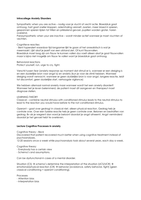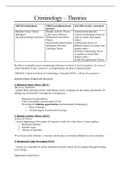Introcollege Anxiety Disorders
Sympathetic when you are active – nodig voor je vlucht of vecht actie. Bloeddruk gaat
omhoog, hart gaat sneller kloppen, ademhaling versnelt, zweten, meer bloed in spieren,
gespannen spieren lijden tot trillen en prikkelend gevoel, pupillen worden groter, haren
overeind.
Parasympathetic when your are inactive – wordt minder actief wanneer je moet vluchten of
vechten.
Cognitieve reacties:
- Bent hyperalert waardoor tijd langzamer lijkt te gaan of het onrealistisch is wat je
meemaakt. Lijkt alsof je jezelf van een afstand ziet. Of kunt flauwvallen.
Bloeddruk moet laag zijn om flauw te kunnen vallen dus voelt alleen alsof je gaat flauwvallen
maar is bijna niet mogelijk om flauw te vallen want je bloeddruk gaat omhoog.
Behavioral reactions
Protect yourself, run, urge to cry, fight.
Verschil tussen fear (anxiety response op moment dat stimuli er is, wanneer er een dreiging is
en een duidelijke bron voor angst is) en anxiety (kun je voor de stimli hebben. Wanneer
dreiging wordt verwacht, wanneer er geen duidelijke bron is voor angst, langere reactie, leidt
tot discomfort, geen duidelijke start, verhoogde vigilance)
We hebben allemaal normal anxiety maar wanneer wordt het een anxiety disorder?
Wanneer het je leven belemmerd, de patient moet dit aangeven en therapeut moet
diagnose stellen.
LEARNING THEORY
Classical – combine neutral stimulus with conditioned stimulus leads to the neutral stimulus to
lead to the reaction you would have before to the not conditioned stimulus.
Operant – gaat over gedrag! In classical niet, alleen physical reaction. Gedrag heb je
controle over. Over een fysieke reactie heb je geen controle over. Belonen en bestraffen van
gedrag. Bv als je wegrent dan word je beloont doordat je angst afneemt. Angst verminderd
doordat je het gevoel hebt te overleven.
Lecture Cognitive Processes in anxiety
Cognitive theory – Beck
Discovered that patient recovered much better when using cognitive treatment instead of
psychoanalyses.
12-20 sessions once a week while psychoanalysis took about several years, each day a week.
Cognitive theory:
- Everybody has a certain view
- Schema’s and assumptions.
Can be dysfunctional in cases of a mental disorder.
Situation (CS) schema’s determine the interpretation of the situation (UCS/UCR)
emotional/physical reaction (CR) behavior (avoidance, safety behavior, fight) (geen
classical conditioning = operant conditioning).
Processes
- Attention bias
- Interpretation bias
Sympathetic when you are active – nodig voor je vlucht of vecht actie. Bloeddruk gaat
omhoog, hart gaat sneller kloppen, ademhaling versnelt, zweten, meer bloed in spieren,
gespannen spieren lijden tot trillen en prikkelend gevoel, pupillen worden groter, haren
overeind.
Parasympathetic when your are inactive – wordt minder actief wanneer je moet vluchten of
vechten.
Cognitieve reacties:
- Bent hyperalert waardoor tijd langzamer lijkt te gaan of het onrealistisch is wat je
meemaakt. Lijkt alsof je jezelf van een afstand ziet. Of kunt flauwvallen.
Bloeddruk moet laag zijn om flauw te kunnen vallen dus voelt alleen alsof je gaat flauwvallen
maar is bijna niet mogelijk om flauw te vallen want je bloeddruk gaat omhoog.
Behavioral reactions
Protect yourself, run, urge to cry, fight.
Verschil tussen fear (anxiety response op moment dat stimuli er is, wanneer er een dreiging is
en een duidelijke bron voor angst is) en anxiety (kun je voor de stimli hebben. Wanneer
dreiging wordt verwacht, wanneer er geen duidelijke bron is voor angst, langere reactie, leidt
tot discomfort, geen duidelijke start, verhoogde vigilance)
We hebben allemaal normal anxiety maar wanneer wordt het een anxiety disorder?
Wanneer het je leven belemmerd, de patient moet dit aangeven en therapeut moet
diagnose stellen.
LEARNING THEORY
Classical – combine neutral stimulus with conditioned stimulus leads to the neutral stimulus to
lead to the reaction you would have before to the not conditioned stimulus.
Operant – gaat over gedrag! In classical niet, alleen physical reaction. Gedrag heb je
controle over. Over een fysieke reactie heb je geen controle over. Belonen en bestraffen van
gedrag. Bv als je wegrent dan word je beloont doordat je angst afneemt. Angst verminderd
doordat je het gevoel hebt te overleven.
Lecture Cognitive Processes in anxiety
Cognitive theory – Beck
Discovered that patient recovered much better when using cognitive treatment instead of
psychoanalyses.
12-20 sessions once a week while psychoanalysis took about several years, each day a week.
Cognitive theory:
- Everybody has a certain view
- Schema’s and assumptions.
Can be dysfunctional in cases of a mental disorder.
Situation (CS) schema’s determine the interpretation of the situation (UCS/UCR)
emotional/physical reaction (CR) behavior (avoidance, safety behavior, fight) (geen
classical conditioning = operant conditioning).
Processes
- Attention bias
- Interpretation bias



